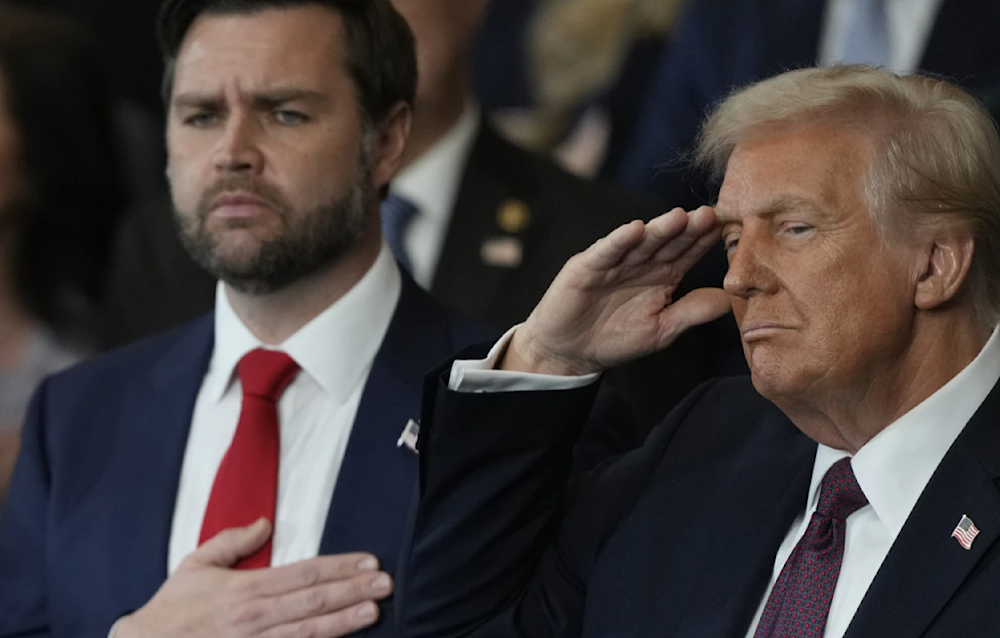Following his inauguration, Panama, Mexico vow to fight Trump schemes
Panamian figures have accused Trump of having an "expansionist agenda".
-

President Donald Trump and Vice President JD Vance listen to Christopher Macchio sing during the 60th Presidential Inauguration in the Rotunda of the US Capitol, on January 20, 2025. (AP)
Panama President José Raúl Mulino firmly rejected President Donald Trump's claim, made during his inaugural speech on Monday, that the United States will "take back" the Panama Canal.
Mulino reiterated Panama's sovereignty over the canal in a message posted on X, underlining that the waterway will continue to be under Panamanian authority as per the Torrijos-Carter Treaty, which was signed in 1977.
•Official Statement•
— Embajada de Panamá en Canadá (@embpanamacan) January 20, 2025
José Raúl Mulino, President of Panama pic.twitter.com/8ewU8f5t9m
During his campaign, Trump made no mention of retaking control of the Panama Canal, but he did start talking about it last month.
During his inauguration address, Trump claimed that the spirit of a contract signed by President Jimmy Carter in 1977, which surrendered ownership of the canal in 1999, had been violated. "The purpose of our deal and the spirit of our treaty has been totally violated," he declared, adding that the canal should have never been given up and that "American ships are being severely overcharged and not treated fairly."
He further claimed that "China is operating the Panama Canal." Earlier this month, he stated that he would not rule out using military action to seize control of it.
Mulino expressed his full rejection of Trump's comments, reiterating that "the Canal was not a concession to anyone. It was the result of generational struggles that culminated in 1999, under the Torrijos-Carter Treaty."
"Since then, for 25 uninterrupted years, we have administered and expanded it responsibly to serve the world and its trade, including the United States," he added in a statement on X.
Panama would maintain its dignity and use the strength afforded by international law as the correct framework for handling inter-state interactions, he continued, warning of any moves that violated the country's sovereignty.
"Dialogue remains the ideal approach to address these issues without compromising our rights, full sovereignty, or ownership of our Canal," Mulino said.
Panamanian movements vow to resist Trump’s threats
Following Trump’s statements, Panamanian movements like trade unions and social movements mobilized in Panama City to defend both the public pension system and the nation's independence, with Saúl Méndez of SUNTRACS emphasizing the importance of preserving sovereignty.
In an interview for Telesur, he stated, “Trump tries to erase with a single whim, what was conquered here with the life of patriots, but today more than ever the defense of sovereignty is intact in the Panamanian people.”
Méndez accused the Trump administration of having an expansionist agenda in reaction to the rise of new powers like China and Russia, as well as the necessity of multilateral accords like the BRICS.
He called Trump's statements "unacceptable and inadmissible," demanding the current government "face this situation firmly and stop saying things like that the US border is in the Darién [part of the Panamanian territory through which hundreds of thousands of migrants pass northward].”
In an interview for the Revolutionary Action Group, Méndez declared that Trump's comments about Greenland, the Gulf of Mexico, and the Panama Canal, as well as declaring drug trafficking groups as "terrorists", are "part of an "imperial madness…in the face of its weakness [that the United States is experiencing today]."
Mexico opposes Trump's policies, vows to help those deported
Shortly after his inauguration, President Trump discontinued the CBP One app, which had helped manage legal entry to the US, effectively closing the border to asylum seekers, prompting Mexico's Interior Secretary, Rosa Icela Rodríguez, to launch the "Mexico Embraces You" initiative to support deported Mexicans.
"Mexico will do everything necessary to defend, care for, and allocate what is needed to receive those who are repatriated in order to achieve their reincorporation to their native country," Rodríguez stated, detailing how the plan will position the National Migration Institute in charge of welcoming Mexicans from abroad, processing their repatriation, and facilitating transfers to their areas of origin.
The government stated that Mexican residents will be granted 2,000 Mexican pesos (about $100) upon arrival to spend throughout their relocation to their place of origin.
Mexican President Claudia Sheinbaum's Cabinet members expressed opposition to his desire to reintroduce the "Remain in Mexico" policy and "unilateral deportations" of Mexican nationals living in the United States.
"If they reinstate it, this is something we don’t agree with. We have a different focus. We want to adjust it," said Juan Ramón de la Fuente, Mexico's secretary of foreign affairs, at a press conference Monday morning.
However, "the desire is to keep the same policies as now," he said. De la Fuente termed the "Remain in Mexico" strategy as "unilateral", which means it does not require the aid of other countries to implement.
While the policy does not require Mexico to process US asylum petitions, de la Fuente stated, "we can come to some agreements and find a way to operate."
Sheinbaum also argued that the CBP One app should be preserved. For her, "this will help alleviate the tension in the northern border of Mexico and the southern border of the U.S."
Trump restated his plan to issue an executive order renaming the Gulf of Mexico as the Gulf of America and while it is unclear if he has the ability to do so, Sheinbaum has responded to Trump by suggesting that the US be called "America Mexicana".

 5 Min Read
5 Min Read








